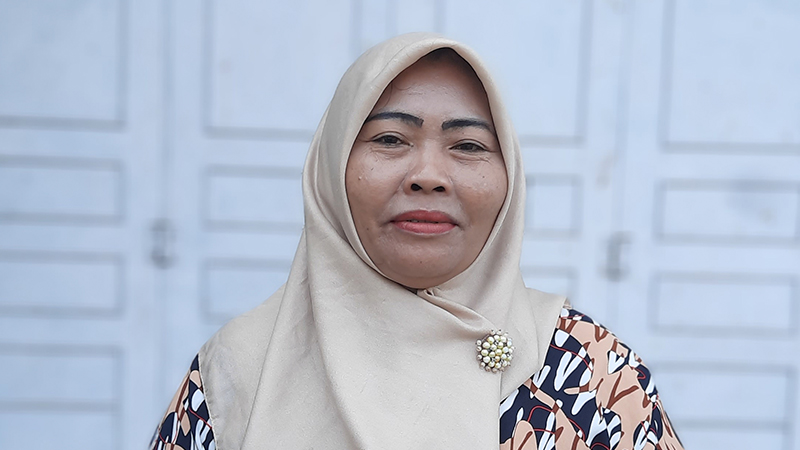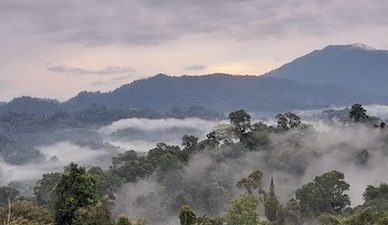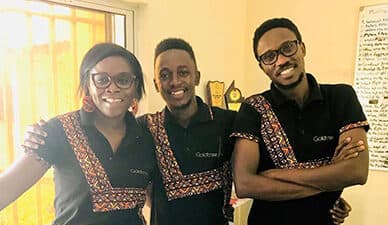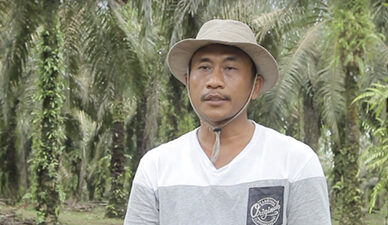An Indonesian smallholder and mother shares her story of certification

Unlike Scheme Smallholders who are able to receive training and assistance from oil palm plantation companies, Independent Smallholders generally learn how to plant oil palm from their neighbours through trial and error, and rarely undergo any agricultural training.
One such smallholder is Ratnawati, a mother of four from Riau, Indonesia, who had been cultivating oil palm since 2000. Recalling the first time she was approached in 2016 by the International Finance Corporation (IFC) of the World Bank Group and Musim Mas to join the Indonesian Palm Oil Development for Smallholders (IPODS) initiative, Ratnawati shared that she was initially reluctant.
“I was hesitant to join the project because I have come across many Independent Smallholder projects with obscure objectives,” she said.
Being a mother and oil palm farmer certainly came with its significant challenges. “My main difficulty was splitting my time between managing my farm and also taking care of my family along with managing finances. My lack of knowledge about good agricultural practices had resulted in high management costs, which impacted my family’s finances, such as a lack of education funds for my children.”
It was a conversation with her eldest son, a field assistant for the IFC-Musim Mas project, that eventually changed her mind to join the smallholders initiative.
“I thought, why not? The only requirement was to form a group with other farmers in my neighbourhood and attend the training, I had nothing to lose,” Ratnawati said. “Also, I wanted to know what fertiliser was needed on my farm.”
The IFC-Musim Mas project team then assisted the newly established association, Pekebun Swadaya Kelapa Sawit Negeri Seribu Kubah, in creating their Internal Control System (ICS). Initially, as members of the association were scattered around eleven villages covering about 144,000 hectares (double the size of Singapore), logistical issues emerged for the team working to ensure that all members applied standard operating procedures. Despite numerous challenges, the association passed the RSPO audit in August 2020.
“The most important lessons our association has obtained from RSPO training and certification are good agricultural practices such as the optimal methods of applying fertiliser and harvesting fresh fruit bunches, integrated pest management and farm management,” said Ratnawati. “I also participated in financial literacy and biodiversity management training.”
Beyond Certification and Credits
Much has changed since those initial days of hesitancy. Today, Ratnawati finds herself as the treasurer of the farmer group association. “Besides being a farmer, I am also a merchant so I am familiar with financial management and financial report writing. Due to this competency, I believe I am the right person to become treasurer of my association.”
Ratnawati praised the collective accomplishments of the group.“Since its inception, our farmers’ association has made incredible progress. Despite public health restrictions due to the COVID-19 pandemic, we received our first RSPO certification in 2020. In early 2021, we received the first payment from selling our RSPO Credits.”
RSPO Credits have significantly benefited the smallholder association by providing funds for training costs, office inventory such as GPS trackers and mobile phones, payroll for members and workers, farm management, and savings to boost the association’s capital.
Reflecting on her journey from being an individual farmer to becoming the farmer group treasurer, a position she’s held since 2019, Ratnawati has a personal message for other women smallholders. “I want to inspire other women and mothers who share the same challenges and aspirations as smallholders. Joining a farmer association has benefited me greatly. You shouldn’t hesitate and be apprehensive about joining a farmer association. I have learned many great things from joining an association, from good agricultural practices to financial literacy that helps to increase my farm’s yields and improve my family’s livelihood.”






